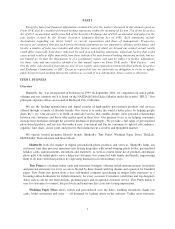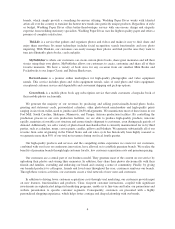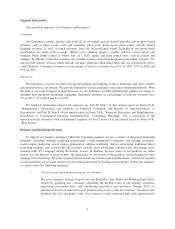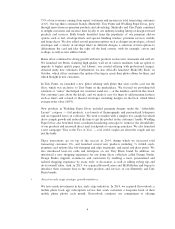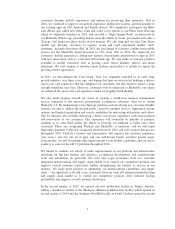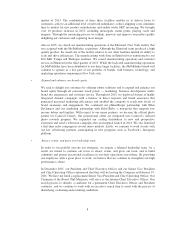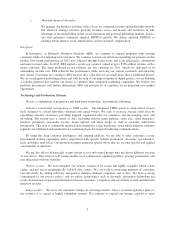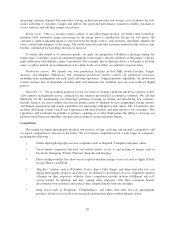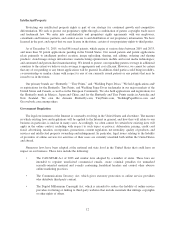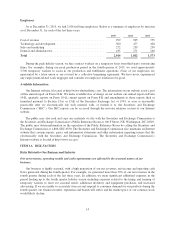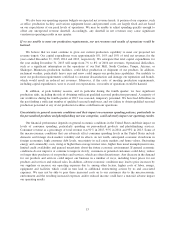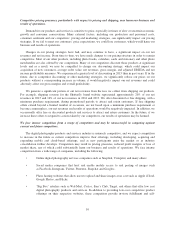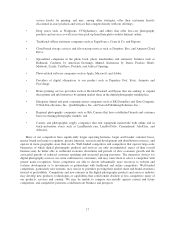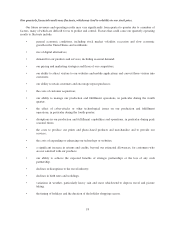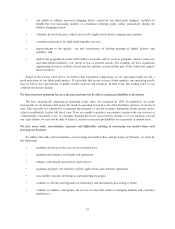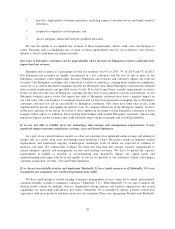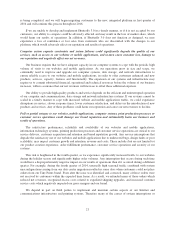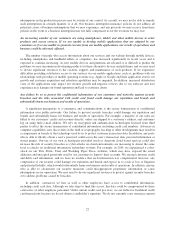Shutterfly 2015 Annual Report Download - page 14
Download and view the complete annual report
Please find page 14 of the 2015 Shutterfly annual report below. You can navigate through the pages in the report by either clicking on the pages listed below, or by using the keyword search tool below to find specific information within the annual report.Intellectual Property
Protecting our intellectual property rights is part of our strategy for continued growth and competitive
differentiation. We seek to protect our proprietary rights through a combination of patent, copyright, trade secret
and trademark law. We enter into confidentiality and proprietary rights agreements with our employees,
consultants and business partners, and control access to and distribution of our proprietary information. We have
licensed in the past, and expect that we may license in the future, certain of our proprietary rights to third parties.
As of December 31, 2015, we had 88 issued patents, which expire at various dates between 2019 and 2033,
and more than 30 patent applications pending in the United States. Our issued patents and patent applications
relate primarily to intelligent product creation; image uploading, sharing, and editing; ordering and sharing
products; cloud image storage infrastructure; manufacturing optimization; mobile and social media technologies;
and automated and personalized manufacturing. We intend to pursue corresponding patent coverage in additional
countries to the extent we believe such coverage is appropriate and cost efficient. However, we cannot be certain
that any of our pending or any future applications will be granted. In addition, third parties could bring invalidity,
co-inventorship or similar claims with respect to any of our currently issued patents or any patents that may be
issued to us in the future.
Our primary brands are “Shutterfly,” “Tiny Prints,” and “Wedding Paper Divas.” We hold applications and/
or registrations for the Shutterfly, Tiny Prints, and Wedding Paper Divas trademarks in our major markets of the
United States and Canada, as well as in the European Community. We also hold applications and registrations for
the Shutterfly mark in Mexico, Japan and China, and for the Shutterfly and Tiny Prints marks in Australia and
New Zealand. We own the domains Shutterfly.com, TinyPrints.com, WeddingPaperDivas.com and
Groovebook.com among others.
Government Regulation
The legal environment of the Internet is constantly evolving in the United States and elsewhere. The manner
in which existing laws and regulations will be applied to the Internet in general, and how they will relate to our
business in particular, is unclear in many cases. Accordingly, we often cannot be certain how existing laws will
apply in the online context, including with respect to such topics as privacy, defamation, pricing, credit card
fraud, advertising, taxation, sweepstakes, promotions, content regulation, net neutrality, quality of products, and
services and intellectual property ownership and infringement. In particular, legal issues relating to the liability
of providers of online services for activities of their users are currently unsettled both within the United States
and abroad.
Numerous laws have been adopted at the national and state level in the United States that could have an
impact on our business. These laws include the following:
• The CAN-SPAM Act of 2003 and similar laws adopted by a number of states. These laws are
intended to regulate unsolicited commercial emails, create criminal penalties for unmarked
sexually-oriented material and e-mails containing fraudulent headers and control other abusive
online marketing practices.
• The Communications Decency Act, which gives statutory protection to online service providers
who distribute third-party content.
• The Digital Millennium Copyright Act, which is intended to reduce the liability of online service
providers for listing or linking to third-party websites that include materials that infringe copyrights
or other rights of others.
12



